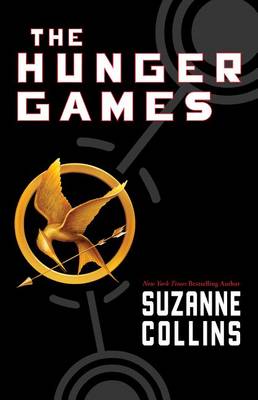Reviewed by brokentune on
"When I was younger, I scared my mother to death, the things I would blurt out about District 12, about the people who rule our country, Panem, from the far-off city called the Capitol. Eventually I understood this would only lead us to more trouble. So I learned to hold my tongue and to turn my features into an indifferent mask so that no one could ever read my thoughts."
I managed to forego reading the books until a few weeks ago when I needed to find some common topic of conversation with someone that I otherwise have little in common with. There is only so much small talk I can bear, and I knew that The Hunger Games was something the other person was interested in. So, I figured I'd read the first book for the silliest of reasons.
What I had not expected was that I adored the first installment and ended up having to read the rest of the series.
What still baffles me is how Collins actually managed to lean on so many existing stories and works of literature and still come away with a story that reads so utterly gripping and original. My initial reaction on reading was to make comparisons to The Lottery and Lord of the Flies and 1984 and every gladiator-themed movie I have ever watched but I soon left these aside to enjoy the story of Katniss Everdeen (Is Collins a fan of the English pastoral as well as ancient Rome?) and the country of Panem just for itself. The literary tributes (haha) became rather fun to look for - like a party game between author and reader - but they did not distract from the story.
So, what about the story?
Well, we have the Katniss and Peeta who are chosen (by lottery) as tributes from their districts to compete against the "tributes" from other districts in a televised fight with with goal to be the last tribute alive and win the prize of ensuring their family's food supply for the rest of their lives. So, again cue the reference to the panem et circenses of Ancient Rome - except that The Hunger Games have the additional twist that they were set up as punishment for the districts' rise against the Capitol some seventy years earlier.
"You get the feeling that the knot-tying class is not the Hunger Games hot spot."
As Katniss and her fellow tributes began the "games", it was very hard to put down the book even for short breaks. The story took on a whole new level as I tried to figure out what motives the different characters had and whether they were trustworthy or not. Yep, a YA book actually had me on the edge of my seat, and by the of book 1 it was not even a question whether I'd read on to find out whether the revolution would win or fail.
"At some point, you have to stop running and turn around and face whoever wants you dead. The hard thing is finding the courage to do it. Well, it’s not hard for Gale. He was born a rebel. I’m the one making an escape plan."
And that's another thing - One of the frustrations I have with books is predictability. Not so here. Nowhere in the trilogy did I get a sense of what the ending would be like. I loved it.
I also really liked the characters: None of them are perfect, least of all Katniss, but that gives them some depth and over the course of the books, Collins gives her characters room to develop and shows the impact of the story on the different personalities - not just the violence and cruelty they are faced with but also the influence of friendships and acts of kindness they witness.
"We’re fickle, stupid beings with poor memories and a great gift for self-destruction."
N.B. Catching Fire (Book 2) is the weakest of the trilogy and basically only acts as the bridge between The Hunger Games and Mockingjay. It's still worth reading, but nowhere near as "original" (not using the word lightly given the many references to existing stories) as Books 1 and 3.
Reading updates
- Started reading
- 7 December, 2015: Finished reading
- 7 December, 2015: Reviewed
